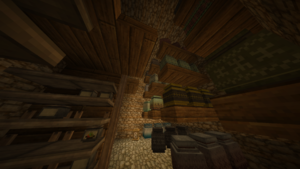Cellar/fr: Difference between revisions
Boblepalapin (talk | contribs) (Created page with "Les '''celliers''' sont un type de structure que les joueurs peuvent créer, dans le but de conserver la nourriture et d'affiner du fromage. L'impact des celliers est plus évident dans les biomes chauds.") |
Boblepalapin (talk | contribs) (Created page with "{{Protip|Les taux de détérioration des celliers se mettent à jour avec un certain retard. Pour obtenir des informations précises après avoir modifié un cellier, placez un nouveau récipient ou une nouvelle étagère dans l'espace et voyez quel est le nouveau taux de détérioration.}}") |
||
| Line 5: | Line 5: | ||
Les '''celliers''' sont un type de structure que les joueurs peuvent créer, dans le but de [[food preservation|conserver la nourriture]] et d'affiner du [[cheese|fromage]]. L'impact des celliers est plus évident dans les biomes chauds. | Les '''celliers''' sont un type de structure que les joueurs peuvent créer, dans le but de [[food preservation|conserver la nourriture]] et d'affiner du [[cheese|fromage]]. L'impact des celliers est plus évident dans les biomes chauds. | ||
{{Protip|Les taux de détérioration des celliers se mettent à jour avec un certain retard. Pour obtenir des informations précises après avoir modifié un cellier, placez un nouveau récipient ou une nouvelle étagère dans l'espace et voyez quel est le nouveau taux de détérioration.}} | |||
{{Protip| | |||
<div lang="en" dir="ltr" class="mw-content-ltr"> | <div lang="en" dir="ltr" class="mw-content-ltr"> | ||
Revision as of 18:45, 23 December 2022
Cette page a été vérifiée pour la dernière fois pour Vintage Story avec la version 1.16.4.
Les celliers sont un type de structure que les joueurs peuvent créer, dans le but de conserver la nourriture et d'affiner du fromage. L'impact des celliers est plus évident dans les biomes chauds.
Remarque :
Les taux de détérioration des celliers se mettent à jour avec un certain retard. Pour obtenir des informations précises après avoir modifié un cellier, placez un nouveau récipient ou une nouvelle étagère dans l'espace et voyez quel est le nouveau taux de détérioration. |
Creation
Any fully-enclosed room at or under 7x7x7 blocks in size may be counted as a cellar by the game. While wooden doors count for enclosing cellars, rough doors do not. Cellars do not need to be underground to work, however since sunlight levels can affect cellar effectiveness, it may be easier to dig an underground cellar than to create an aboveground one. Any blocks may be used to create a cellar, however for maximum effectiveness dirt, brick and stone blocks (such as packed dirt or cobblestone) should be used. The higher the outside temperature is, the more the building material matters. Mixing material types will reduce the effectiveness of the cellar depending on how much non-dirt, non-stone or non-brick blocks are used.
Light restriction
Sunlight reaching the cellar can reduce the effect of cellars, as well as having an impact on cheese ripening. Transparent blocks such as glass or doors, which may let in light, will reduce the effectiveness of cellars. Therefore, it is recommended to seal up cellars using blocks like dirt or hay, or to include a sharp bend in the hallway leading to the cellar to prevent sunlight from reaching inside the room.
Player-created light sources, such as torches and lanterns, have no impact on cellar effectiveness.
Uses
The main use of cellars is for food preservation. Cellars reduce the rate of spoilage for any foods stored inside, and stack with container types, so placing storage containers and sealed crocks into a cellar can drastically extend the shelf-life of any food inside them. Cellar effects are strongest on grains, vegetables and fruits.
Cellars are also used to ripen cheese by lowering their spoilage timer, so that the cheese can ripen before it spoils. Cheese may ripen into either cheddar or blue cheese, depending on the conditions of the ripening cellar. Cheddar has no special requirements, while blue cheese requires a cellar with unblocked access to air and a sunlight level below 2.
| Agriculture | |
|---|---|
| Aliments sauvages | Baies • Fruit de saguaro • Champignons • Roseaux (et papyrus) |
| Céréales | Amarante • Manioc • Lin • Riz • Seigle • Épeautre • Tournesol |
| Légumes | Chou • Carotte • Oignon • Navet • Panais • Arachide • Citrouille • Soja |
| Fruits | Arbres fruitiers • Ananas |
| Autre | Engrais • Apiculture • Serre |
| Outils | Houe • Faux • Pressoir |
| Voir aussi | Élevage • Cuisine • Préservation des aliments |
